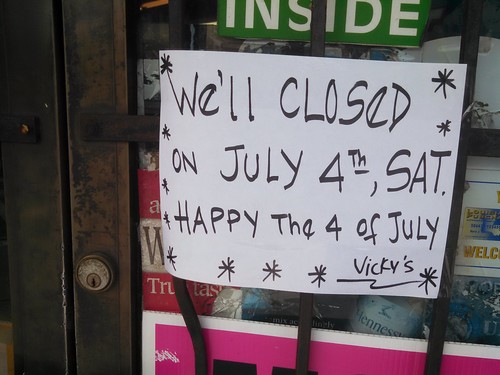
It's not easy finding the right quote. I'm always a fan of "Celebrate the independence of your nation by blowing up a small part of it."
But also today is a good day to read Frederick Douglass's famous1852 Independence Day address to a New York abolition society. Douglass's purpose is to bring to light the hypocrisy of a celebration of American liberty against the context of the slave society that was its backdrop. In doing so he provides us the following handy guide to what sort of rhetoric is appropriate for this conversation.
At a time like this, scorching irony, not convincing argument, is needed. O! had I the ability, and could I reach the nation’s ear, I would, to-day, pour out a fiery stream of biting ridicule, blasting reproach, withering sarcasm, and stern rebuke. For it is not light that is needed, but fire; it is not the gentle shower, but thunder. We need the storm, the whirlwind, and the earthquake. The feeling of the nation must be quickened; the conscience of the nation must be roused; the propriety of the nation must be startled; the hypocrisy of the nation must be exposed; and its crimes against God and man must be proclaimed and denounced.Remember that the next time some consensus politician or haughty newspaper editor waves a finger at you about the importance of maintaining "civil discourse" being above any other concern.
Douglass also talks about the boldness of the revolutionary impulse. Any great change, no matter the righteousness of the cause, is always in danger of being stunted as the timid and comfortable prefer to side with the powerful out of self-preservation.
Oppression makes a wise man mad. Your fathers were wise men, and if they did not go mad, they became restive under this treatment. They felt themselves the victims of grievous wrongs, wholly incurable in their colonial capacity. With brave men there is always a remedy for oppression. Just here, the idea of a total separation of the colonies from the crown was born! It was a startling idea, much more so, than we, at this distance of time, regard it. The timid and the prudent (as has been intimated) of that day, were, of course, shocked and alarmed by it.Prudence, respectability, and.. of course.. money. These are the ambitions that cause people to end up on the wrong side of history. And this applies to most people most of the time.
Such people lived then, had lived before, and will, probably, ever have a place on this planet; and their course, in respect to any great change, (no matter how great the good to be attained, or the wrong to be redressed by it), may be calculated with as much precision as can be the course of the stars. They hate all changes, but silver, gold and copper change! Of this sort of change they are always strongly in favor.
These people were called Tories in the days of your fathers; and the appellation, probably, conveyed the same idea that is meant by a more modern, though a somewhat less euphonious term, which we often find in our papers, applied to some of our old politicians.
Their opposition to the then dangerous thought was earnest and powerful; but, amid all their terror and affrighted vociferations against it, the alarming and revolutionary idea moved on, and the country with it.
That might be worth remembering on Sunday, by the way.
At the same time, we already see a massive polarization of Greek society. The Yes campaign is combining a mobilization of bourgeois and middle-class strata (a very large number of professional associations support Yes) and the deployment of all forms of ideological warfare. The private media are propaganda machines for the “yes” vote, and Greek corporations openly threaten their employees with mass layoffs if there is a “no” vote, using the refusal to pay wages as a means to make the threat credible.
Fear is beginning to become the determining factor. At the same time, you see also signs of radicalization in the No camp, with people more ready than ever to accept the full cost of rupture if this opens up the prospect of an end to austerity.
No comments:
Post a Comment